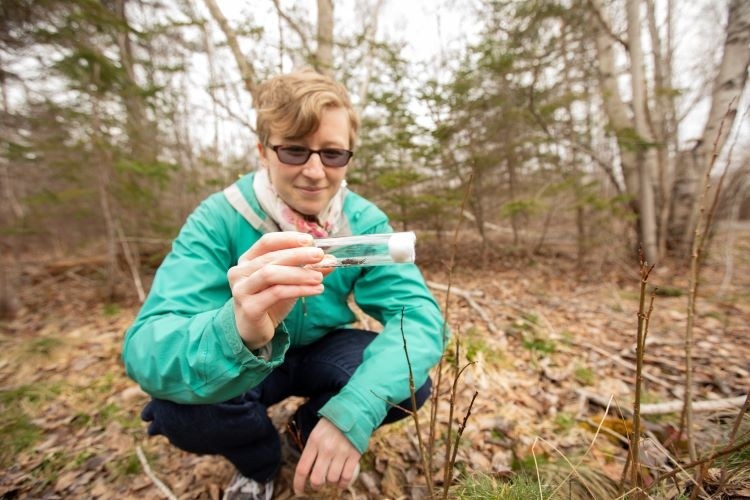
StFX biology professor Dr. Jantina Toxopeus wants to understand how insects overwinter, particularly under climate change, and has received almost $170,000 in research funding for the project, “Atlantic Canada Centre for the Biology of Insect Overwintering.”
Dr. Toxopeus has received $67,879 in funding from the Canadian Foundation for Innovation’s (CFI) John R. Evans Leaders Fund (JELF), as well as $67,879 in matching funding from Research Nova Scotia.
The Honourable François-Philippe Champagne, Minister of Innovation, Science and Industry, announced on Aug. 11th more than $77 million to support 332 research infrastructure projects at 50 universities across the country. This contribution, through the CFI John R. Evans Leaders Fund will help universities attract and retain top researchers.
“The support of the federal and provincial governments for research infrastructure is really critical for the success of early career researchers such as Dr. Toxopeus,” says Dr. Richard Isnor, StFX Associate Vice President of Research and Graduate Studies. “This laboratory, which envisaged to be an Atlantic Canada-wide collaborative research centre, has already generated interest from, and potential research collaborations with, several government departments.”

Dr. Toxopeus says the funds will be used to purchase a refrigerated incubator system, a programmable recirculating bath system, a thermocycler system, a microbalance system, an ultracold freezer with racks, and other small lab equipment. It will also support the completion of modest lab renovations.
“Insects are the most abundant animals on the planet, and can have substantial economic impacts – both beneficial (e.g. pollination) and detrimental (e.g. invasive agricultural pests),” she says. “Under climate change, winters are changing faster than summers, so understanding how insects overwinter is important. The proposed research will examine how insects survive freezing, focusing on the cell biology of the spring field cricket.”
Dr. Toxopeus says these crickets can substantially modify their cold tolerance, transitioning from freeze-intolerant to freeze-tolerant when acclimated to six weeks of fall-like conditions.
The proposed research program will characterize how environmental cues during acclimation alter cell biology and will determine which changes in cell biology are important for mitigating the challenges of cold and ice.
“This research will use cell and molecular biology, biochemistry, and RNA interference to examine the damage that freezing can cause, and a range of cellular processes that may prevent or repair this damage. These experiments have potential to substantially advance our understanding of how insects survive internal ice formation, addressing fundamental knowledge gaps in the field. More broadly, the knowledge gained has potential application to agriculture (insect pest management), as well as to cryopreservation of mammalian tissues (for biomedical purposes) and food (for commercial purposes).”
This research is, in part, made possible by the Government of Canada Research Support Fund.

